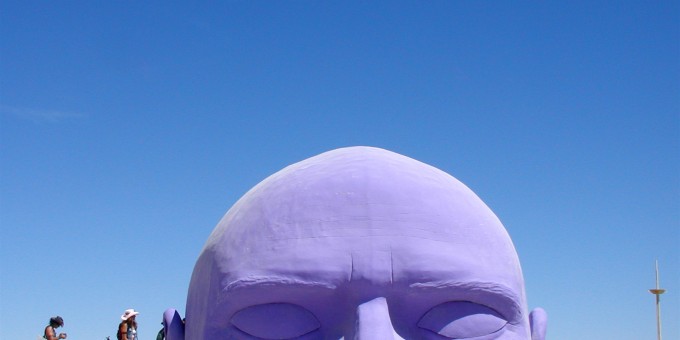
Each year around Labor Day, nearly 60,000 people gather to participate in Burning Man, an “experimental community” committed to art, creativity, and free expression. The festival began on a San Francisco beach in 1986 and has since moved to the Black Rock Desert, a vast alkali salt flat in northwestern Nevada. Here on the “the playa,” as the ancient seabed is called, participants construct the teeming Black Rock City. The pop-up utopia is built up from hundreds of individual “theme camps” (extended households or tribes), ranging in size from five to 500 individuals and organized around a common identity, concept, or practice.
Everywhere, there is art—performance art, installation art, body art, experiential and immersive art—scaled from the microscopic to the size of tractor-trailers. Participants are encouraged to embrace, imbibe, and abide by the ten principles of the event. These include, among other things, the ideals of radical inclusion, self-expression, and self-reliance, as well as an ethos of gift-giving, immediacy, and leaving-no-trace. Some of the ten principles (like decommodification, defined as resisting “the substitution of consumption for participatory experience”) stand in sharp contrast to mainstream American values. Others, like radical self-reliance, lay at the core of the American dream.
Burning Man brings to mind a lot of preconceptions, but it also raises a lot of questions, from the sociological to the plain old curious. What is this event about? What purposes does it serve? Who is involved and why? And what does this festival say about art and expression in America? I brought together three of my fellow social scientists—all of whom have attended the event, think of themselves as “Burners,” and have done research on Burning Man—to talk a bit about what these days in the desert mean to us and what larger social significance Burning Man might hold.
Many Burners have adopted a “playa name,” something like a public persona. Why is your playa name, if you have one, meaningful to you? How are alter-egos socially significant?
Katherine Chen: I don’t have a playa name, but most Burners do. Asking about how someone has acquired a nickname can reveal insights into a person’s biography, past and future. For example, “Chicken John” told me that he got his nickname as a youngster because when he got angry, his friends thought he looked like a chicken. Others pick names that they aspire to.
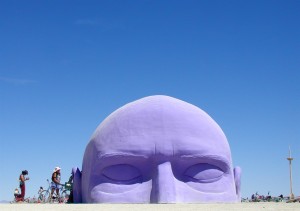
In general, playa names help people explore and develop new identities and roles—ones that may not be assigned by characteristics that people are born with (like race/ethnicity or gender, for instance). People may also change their playa names to reflect their growth. I think the phenomena of playa names speaks partly to the constraints of society (not everyone wants to be known just as an employee of such-and-such organization or the relative of so-and-so) and partly to people’s capacity for creativity and re-invention. Jon Stern has been working on this phenomenon at Burning Man and in the virtual reality game-world Second Life.
Jon Stern: I didn’t have a playa name until my third year. That year I worked with Census and got gifted the names “Gadget” and “Gadget Fairy” by Black Rock City Census [a data collection project undertaken at each year’s festival]. However, the playa name I use mostly is “Wee Heavy.” It’s the name I use with the Black Rock Rangers (the volunteer safety and security team) and it has also become my handle in PG&E (the perimeter, gate, and exodus) Department of the festival as well. Wee Heavy comes from the name of a particular beer from Alesmith Brewing in San Diego.
Even as my personal identity and appearance has shifted, my playa name has remained constant. For me, it’s an important part of my identity, but I know that playa names often have various levels of meaning to the individual. Some long-time staff have playa names, but still choose to use their given names (like Seth, the Exodus Manager who has been nicknamed “Blue Cross”), while departments that use radios require playa names or handles, and those handles become important signifiers of that person’s particular identity.
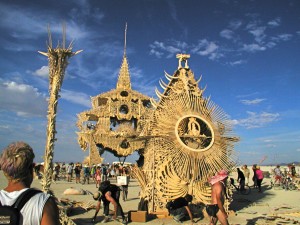
Matt Wray: While I agree with Katherine and Wee Heavy about how playa names are used to help Burners create new identities—or remake old ones—I think that there are some other things going on as well. Like Jon’s first playa names, I didn’t really choose my playa name. Mine, “Burping Man,” was given to me by my theme camp because I have the ability to belch loudly and to talk—whole paragraphs—at the same time. In most contexts, this questionable talent is met with disgust or, at best, mild amusement. On the playa, it has become central to my identity in a way I never anticipated or even asked for. Off playa, I’m a nice guy—I try to be civil to everyone I meet. But Burping Man is a bit of a rude asshole, a bit surly and always trying to provoke disgust. I’ve tried various times to retire this persona, but there is always protest. It’s a role I’m practically required to play while I’m there. Rather than fight that war, I burp.
So you see, even in my alter ego, I’m somewhat constrained by community standards, habits, and expectations. It sound ridiculous to say it, but being Burping Man has made me wonder how free any of us really are as individuals.
Megan Heller: Anthropologist Thomas Weisner has argued that human development is not a linear process—a person can develop along many possible pathways. I would add that these developmental pathways can multiply in environments that foster personal explorations—and where names are not fixed! The significance of a new playa name is that it allows a person to explore and develop an alternative possibility for the self—in terms of identity, of course, but also in terms of their comportment and skills. I have had many playa names over the years: “Bunny” (because I was wearing bunny ears that day), “Chameleon” (because people often do not recognize me in various costumes), and “Ginger Snap” (because of my temper), but the playa name that most people know me by is “the Countess.” I gave myself this name when I assumed management of the Black Rock City Census in 2004.The Countess is a female version of the Count from Sesame Street. As the Countess, I count Burners: “One Burner, two Burners, three Burners, four… MUAH HA HA HA HA!” I have encouraged other members of the Census team to assume mathematical names. “Equator,” “Variance,” and “Random” have followed the tradition.
As the Countess, I have assumed a great deal of responsibility (on and off the playa) for a very large, collaborative data collection project called the Black Rock City Census. The experience has given me an opportunity to grow into that leadership role and learn new skills, including how to collaborate with researchers and volunteers from many parts of the globe and the Burning Man organization. Simultaneously, I express my femininity through this persona, using creative costuming and adopting a fiercely protective, motherly attitude toward my team. The Countess has given me a platform for learning and growth, as well as a recognizable position in the community.
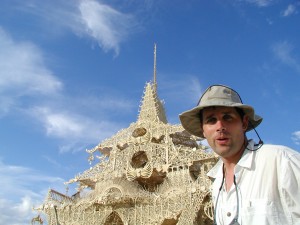
Why might the demographics of the Burning Man population be of interest to researchers? For instance, there is a cultural trope that people who go to Burning Man are often marginalized individuals—outsiders in some way. Could the festival’s annual Census be used to measure this rather subjective characteristic of the population? Is there a single “modal demographic” (that is, a specific Burner “type”) or are there many? What else does the Census Lab measure (or not measure)?
Chen: People often have an idea of what they think the typical Burner is in terms of age or interests, but the Census’s convenience survey has revealed greater diversity than people might expect. One Burner compared Burning Man to the Internet—if you can think it, you can find someone else who is into it at Burning Man. As media images show, Burning Man does attract subcultures of persons who might be marginalized in their hometowns because of their appearance, interests, or ways of thinking. At the same time, people who do not appear marginal also attend Burning Man, perhaps because they are seeking a connection of some sort.
Given this, maybe the question should be more about how alienation (rather than marginalization) pushes people towards Burning Man. When I interviewed people about why they volunteered, putting in long hours of work, sometimes back-breaking labor, they cited reasons such as: they got more meaning out of their work for Burning Man than their paid work, they wanted to meet more people who were similar-thinking, they wanted a new experience besides what they have gotten from work and family, etc. Maybe the Census could measure how Burning Man alleviates (or fosters) alienation.
Burping Man (Wray): I’ll leave the question about what types of people frequently show up at Burning Man to the Countess (Heller), who has a better handle on the Census data than I do, but I’ve always been struck at how little the demographics of Burning Man reflect the diversity of the Bay Area or California more generally. While it is true that there is a wide array of subcultures represented at the event, there is much less racial diversity than you might expect. I attended for 14 consecutive years, from 1993 to 2006, and perhaps it has changed in more recent years, but the whiteness of Burning Man was striking. So I never thought of Burners as marginalized members of society. Quite the opposite: the event seemed to be pulling from the most privileged racial group.
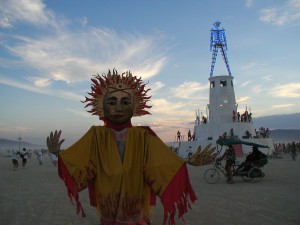
I like Katherine’s reframing of the question, because I’ve always thought that perhaps Burners were drawn to the event as a way of dealing with unwanted privilege—a kind of potlatch ceremony where whites give up the excess they have accumulated over the year and try to re-distribute that to a larger community, as a way of unburdening themselves of both the excess and the guilt that comes with having been given too much. This is a very tribal dynamic at work: if you don’t periodically burn off the abundant excess, tribal solidarity fails. I think this may be part of the symbolic significance of the event, whether or not most participants are aware it. Does this interpretation make any sense to anyone else? Where is an anthropologist when you need one? Countess?
Wee Heavy (Stern): The demographics are difficult to pinpoint, but there are some patterns that are easy to discern. This is a diverse event, but the majority of participants remain white, and if I had to make a guess on the average age, I’d say late 30s. While it is indeed a very white event, the class tiers that exist within this white group of people are many. The class diversity stems in some part due to the differences that exists between the rich participant groups from the Silicon Valley and the less well-off groups that staff event services.
Countess (Heller): As an anthropologist, I appreciate Matt’s analysis of the potlatch and Katherine’s point about alienation. Perhaps there might be a way to measure alienation—or, the term I prefer: dislocation. Any ideas from readers about how to measure this would be appreciated.
On this question of the demographics, I’d rather not report modal statistics on demographic variables. I would rather not feed into people’s desires to characterize, label, and stereotype others by reducing the complexity of an entire population down to a single number. I prefer to display entire distributions. Certainly the Black Rock City Census data shows that there are a lot of people in their 30s and a lot of white people at Burning Man, but there is a great deal of diversity as well. Diversity tends to be overlooked when researchers focus on the center of a distribution.For example, the majority of burners identify as heterosexual, but this does not negate the fact that other sexual orientations are quite acceptable and visible at Burning Man. Many find that Black Rock City is a very safe place to come out of the closet and experiment with their sexuality. Some minorities and subcultural groups may find Burning Man to be a tolerant place; others may not. The main point of the Census, in my mind, is to explore this diversity and share our findings with the Burning Man community and the press.
The Census is no longer using just a convenience sample. In 2012, we successfully instituted a random sample, which we conducted at the main entrance gate. See the results here.
We are now using that representative data to adjust the results of last year’s paper form and the online survey we conducted after the event. In 2013, we will focus our efforts on the random sample and the online survey only. We will no longer be using the paper form.
Burning Man sometimes gets portrayed as little more than a giant rave—a psychedelic party on the playa. It is like a party in many ways, but those of us who go know that the label doesn’t begin to capture the full experience. What larger phenomena does Burning Man represent in your research? In other words, how do you categorize the event and why should we take it seriously?
Chen: People often forget that Burning Man arises from larger society. Although people may see Burning Man as an escape from society, the festival is still informed by society—people bring their habits, customs, and ideas with them. In these ways, Burning Man reflects society.
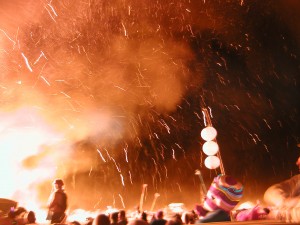
At the same time, the festival’s internal principles, some of which run counter to societal norms, encourage creative transformations of seemingly mundane, everyday actions. Burning Man principles that urge participation, self-expression, and community can help transform the meaning of picking up litter under “Leave No Trace,” for instance. Burning Man also enables people to develop rituals, such as grieving for a departed loved one (see Lee Gilmore and Sarah Pike’s respective work, for instance) or biking en masse alongside one’s compatriots (see Wendy Clupper’s analysis of Critical Tits, the female bike parade), that aren’t readily available in society at large.
For me, the most fascinating aspect of Burning Man is how it regularly organizes creative, large-scale output. On the one hand, you don’t want to under-organize or provide too little support and coordination for people’s efforts, such that the event falls apart. On the other hand, you don’t want to over-organize, or have excessive organization that relies on coercion to “encourage” people to carry out actions. Most people are familiar with the latter via their experiences with bureaucracies at work, for instance, and they don’t want to repeat those experiences. Nor do they want a routinized output like what Disney produces. My book Enabling Creative Chaos: The Organization Behind the Burning Man Event and other publications address how to avoid these excesses and explore other issues, like how do you inspire people to take unfamiliar action? (You can view several of my publications on storytelling and organizing here.)
One promising area of research is how Burning Man’s principles and activities have spread around the world, in the form of regionals and Burning Man-inspired events, organizations, and voluntary associations. Although such off-shoots will retain some elements of Burning Man, the practices are likely to change meaning in local contexts. If so, researchers could study how are these expressed, and how might they feed back into Burning Man, possibly re-invigorating Burning Man? In addition, what’s the impact of Burning Man upon larger society? How is Burning Man building social capital and fostering community resilience?Burping Man (Wray): I really like Katherine’s questions about the spreading influence of Burning Man. It would make an interesting case study in the process of global cultural diffusion, especially since it has a clear start date.
In terms of how I label the event, I have always found it useful and instructive to view it through the historical lens of American experiments with utopian, intentional communities. These have a long, fascinating, and mostly unknown history, since you’re not likely to see it in most high school textbooks. Utopian communitarianism involves a group of people choosing to set themselves apart in a new place in order to make a better world, according to visions and principles they share. This has most often arisen from religious impulses—the Puritans are an early example of Americans doing this, as are the Mormons—but there have also been secular versions, a large number of which ended up in California (see Robert Hine’s California’s Utopian Colonies), which is where Burning Man originated in 1986.
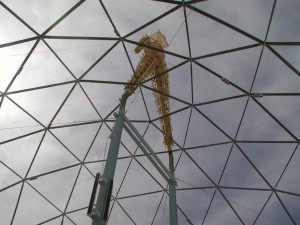
What’s distinctive about Burning Man is that it is a temporary intentional community. It’s more like a family reunion or a bluegrass festival than it is like a settlement of true believers. And I’m very interested in this temporary aspect of the event, because I think that is a key ingredient in its special sauce. It’s part of what has made the event so enormously successful—far more successful, in many ways, than any of its historical forbears, most of which failed spectacularly within a few years. I think future researchers might explore this element of the event’s organization—its temporal dimension—quite fruitfully. Is ephemerality part of its success? Is impermanence what makes it sustainable?
Wee Heavy (Stern): I like to think of Burning Man as a social experiment, an artistic gathering, and an event that seems simple on the surface but belies a complex machine underneath. My research focuses on identity, and Burning Man is a fertile ground for exploration of identity. In the process of doing my own research, I found myself comfortable enough to come out of the closet, which I did in June 2011. I came out Gender Queer (meaning I’m both a man and a woman and either at the same time) because I found a group of people who supported me for who I am, and I knew even if I lost everyone else in my life, I’d still have them.
Sure, on the surface Burning Man seems like a big party, but most things seem simple if we only take a look at the surface. If we peel back layers from the surface, we can see the intense level of infrastructure that exists supporting the participant’s ability to party. Reinforcing Katherine’s points, the organization that brings about the creativity at the event is well maintained and staffed by an array of talented volunteers who make the event occur. We can see the gift economy thriving in the capacity of volunteers who work tirelessly in many departments to make the entire city function as it should.Countess (Heller): I describe Burning Man as a playground. The focus of my research is adult play and transformation. In the United States, children’s play is considered important and valuable, if not essential, to a child’s healthy development. But at Burning Man, adult play is considered important; it is the central point of the event. The question posed here shows a cultural prejudice against adult play and adult play spaces, such as raves and parties, where adults are allowed to experience the transformative potential of play. In my research, I see opportunities to play freely, without ordinary social constraints, as potentially benefitting an adult as they develop over time. On the playa, just as on a playground, a person may discover or invent possibilities that might seem impossible in ordinary cultural contexts. I take the Burning Man event seriously as a playground to explore human potentials and to develop cultural practices that promote individual well being and strengthen ties of interpersonal relatedness.
Burning Man is many different things to many different people. But at the center of the experience is a commitment to free expression and creativity. This puts the event squarely in the arena of “culture,” as most people understand the word. Yet this conventional view of culture is pretty narrow. Social scientists use the word more broadly, encompassing how people in groups organize their worlds. What broad aspects of culture do you see operating at Burning Man?

Chen: Experiences at Burning Man can enlarge people’s ways of seeing, being, interacting, and thinking. A big one for me is the expansion of the organizing toolkit. Once people figure out that they don’t have to wait for institutions to organize things for them, they can take action and produce projects that can meet or even exceed people’s expectations. Of course, we’re talking about people who have the resources and inclination to undertake projects. (In other words, I don’t think that this can necessarily substitute for the state or other societal arrangements—they can be complementary.)
Another aspect is that Burning Man can help people examine taken-for-granted beliefs. In everyday life, people often accept phenomena such as poverty, inequality, racism, sexism, environmental degradation, and other social issues as “the way that the world works.” At Burning Man, these issues don’t go away, but people can start to imagine other possibilities and actions that they can take to address these. Although these actions may initially be small-scale, they may add up to something larger. In other words, Burning Man can cultivate what social scientists call reflexivity. For example, Burners will ask what does it mean to be inclusive? What if someone does something harmful or distasteful to the community? Are we still obligated to include that person? How can we encourage people to reduce waste and recycle? Can we do this in a fun way? How do we prod transgressors to alter their ways? These are all dilemmas that people will have to contend with no matter where they are, from a small village to the worldwide web.
Burping Man (Wray): In a recent essay (read it here), I try to convince readers that Burning Man makes an interesting case study for cultural sociologists. I talk about the search for meaning that we all experience and how that search always draws from—and contributes to—shared representations of the world. Like Katherine, I find that a lot of Burners are innovators. They don’t wait for society to present solutions to their problems… Instead, they imagine new solutions. Sometimes—a great deal of the time, if I’m honest—this takes the form of mockery and satire: Let’s dispense with this social problem by making fun of the people who think it is a problem. So you have a great deal of playa humor aimed at bureaucratic society, the failures of government and religion, and at people whose views of sex, gender, and drugs—to take just a few examples—seem puritanical, phobic, and punitive to Burners.I like this DIY/steampunk/anarchic spirit hovering over the event. It’s a fierce, guardian spirit that resists turning a cultural innovation into just another commodity. It insists that these innovations be given as gifts. That really feeds me, because so much of what American culture offers up for consumption is so bland and conformist, even as it revels in its own brand of cool iconoclasm (see Frank’s The Conquest of Cool). I don’t dislike commodified American culture because I’m a snob. I dislike it because it makes me feel dead inside. And whenever I’m on the playa, I know I’m not alone in feeling that way. And that makes me feel connected to others, which is pretty much what everyone needs to feel in order to be happy. So this aspect of the culture of Burning Man, which feels inclusive to those of us who feel excluded—or to use Katherine’s term, alienated—by American culture, this aspect needs to be better understood by social scientists.
Wee Heavy (Stern): Culture is indeed a multifaceted concept… Some cultural aspects of Burning Man include ritual, micro-level interaction, the pervasiveness of the ten principles, the transmission of information, and the art we don’t see as art. The event itself is a ritual, but it is also made up of many smaller rituals which have varying levels of importance for a given participant or the city as a whole. For many, even the journey to the event is a major part of their ritual…
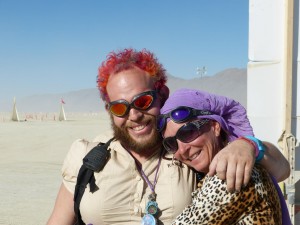
Micro-level interactions are very important to the overall atmosphere and culture of TTITD—That Thing In The Desert, as Burning Man is sometimes called. As a person who lives out—openly queer—my interactions with strangers in the default world can range from nice and cordial to people staring at me, taking pictures without my permission, and making rude comments. Interactions on playa tend to be uniformly cordial, polite, and respectful, even if they only last a few seconds. This plays off of Katherine’s points about what people normally take for granted. While the event is only a week long, I’ve been extending my time on playa both for my own enjoyment and to conduct more fieldwork with staff pre- and post-event. Acclimating to playa isn’t simply something that takes place physically. It also involves acculturating and becoming part of the social atmosphere that exists around us.
Countess (Heller): I see the Burning Man event as an antidote to the widespread experience of dislocation, the condition in which most of us find ourselves, shorn of culture and individual identity in a globalized world in which people’s needs are subordinate to the market. Burning Man is an opportunity to be relocated, to experience a potential home where people’s needs are valued… and people are encouraged to bring creative cultural practices and identities to share with others. To experience a real sense of home, even for only one week…, and to set one’s roots deep in that ground, is to be given a sense of pride and belonging that can be… taken with you wherever you roam.
—–
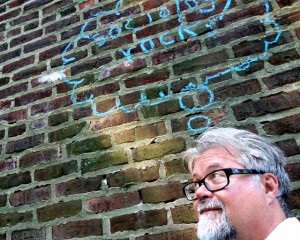 Matt Wray (Burping Man) is in the sociology department at Temple University and is the editor of Cultural Sociology: An Introductory Reader. He has been writing about Burning Man since 1995.
Matt Wray (Burping Man) is in the sociology department at Temple University and is the editor of Cultural Sociology: An Introductory Reader. He has been writing about Burning Man since 1995.

Comments 4
lotus — August 17, 2013
thank you thank you thank you!!!! this is great stuff.
“Economy of Loving Kindness” | Burners.Me: Me, Burners and The Man — December 1, 2013
[…] else: the real and vital community I was surprised to find among the festival’s motley crowd of academics and soldiers, financial advisors and college students, Silicon Valley techies and […]
Here’s some sciencey stuff… | The Art of Transgression — February 18, 2014
[…] …to back some of my enthusiastic speculation: Burning Man: A Roundtable Discussion […]
Friday Roundup (Monday Edition): Sept. 9, 2013 » The Editors' Desk — April 1, 2014
[…] Cyborgology. Getting in early on the “Burning man is the new…” media meme, the Cyborgs wonder if Burning Man is the new capitalism. For more on Burning Man, of course, check out our Roundtable with four sociologist/burners here […]